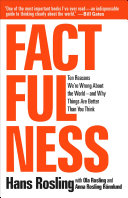

Factfulness, authored by Hans Rosling, is a compelling exploration of the misconceptions that shape our understanding of the world. Through a combination of engaging storytelling and robust data analysis, Rosling seeks t...
Continue readingThe Gap Instinct refers to the tendency of people to divide the world into two distinct groups: the rich and the poor. This binary thinking can lead to a distorted view of global progress and development. In reality, the...
Continue readingThe Negativity Instinct is the human tendency to focus on negative news, which can create a perception that the world is getting worse. Rosling argues that while negative events do occur, they are often overrepresented i...
Continue readingThe Straight Line Instinct is the assumption that trends will continue in a straight line without considering potential changes in direction. This can lead to unrealistic expectations about future developments, particula...
Continue readingThe Fear Instinct refers to the tendency to overestimate the dangers of certain situations based on emotional responses rather than factual evidence. This instinct can lead to irrational fears about issues like terrorism...
Continue readingThe Size Instinct is the tendency to misjudge the significance of numbers without considering their context. People often react to large numbers with alarm, assuming they represent a greater threat or problem than smalle...
Continue readingThe Generalization Instinct is the inclination to make sweeping assumptions about groups of people based on limited experiences or stereotypes. This instinct can lead to misconceptions about entire cultures, countries, o...
Continue readingThe Destiny Instinct is the belief that certain aspects of society, culture, or geography are fixed and unchangeable. This mindset can lead to fatalism and a lack of motivation to drive change. Rosling argues that histor...
Continue readingThe reading time for Factfulness depends on the reader's pace. However, this concise book summary covers the 7 key ideas from Factfulness, allowing you to quickly understand the main concepts, insights, and practical applications in around 21 min.
Factfulness is definitely worth reading. The book covers essential topics including The Gap Instinct, The Negativity Instinct, The Straight Line Instinct, providing practical insights and actionable advice. Whether you read the full book or our concise summary, Factfulness delivers valuable knowledge that can help you improve your understanding and apply these concepts in your personal or professional life.
Factfulness was written by Anna Rosling Rönnlund, Hans Rosling, Ola Rosling.
If you enjoyed Factfulness by Anna Rosling Rönnlund, Hans Rosling, Ola Rosling and want to explore similar topics or deepen your understanding, we highly recommend these related book summaries:
These books cover related themes, complementary concepts, and will help you build upon the knowledge gained from Factfulness. Each of these summaries provides concise insights that can further enhance your understanding and practical application of the ideas presented in Factfulness.